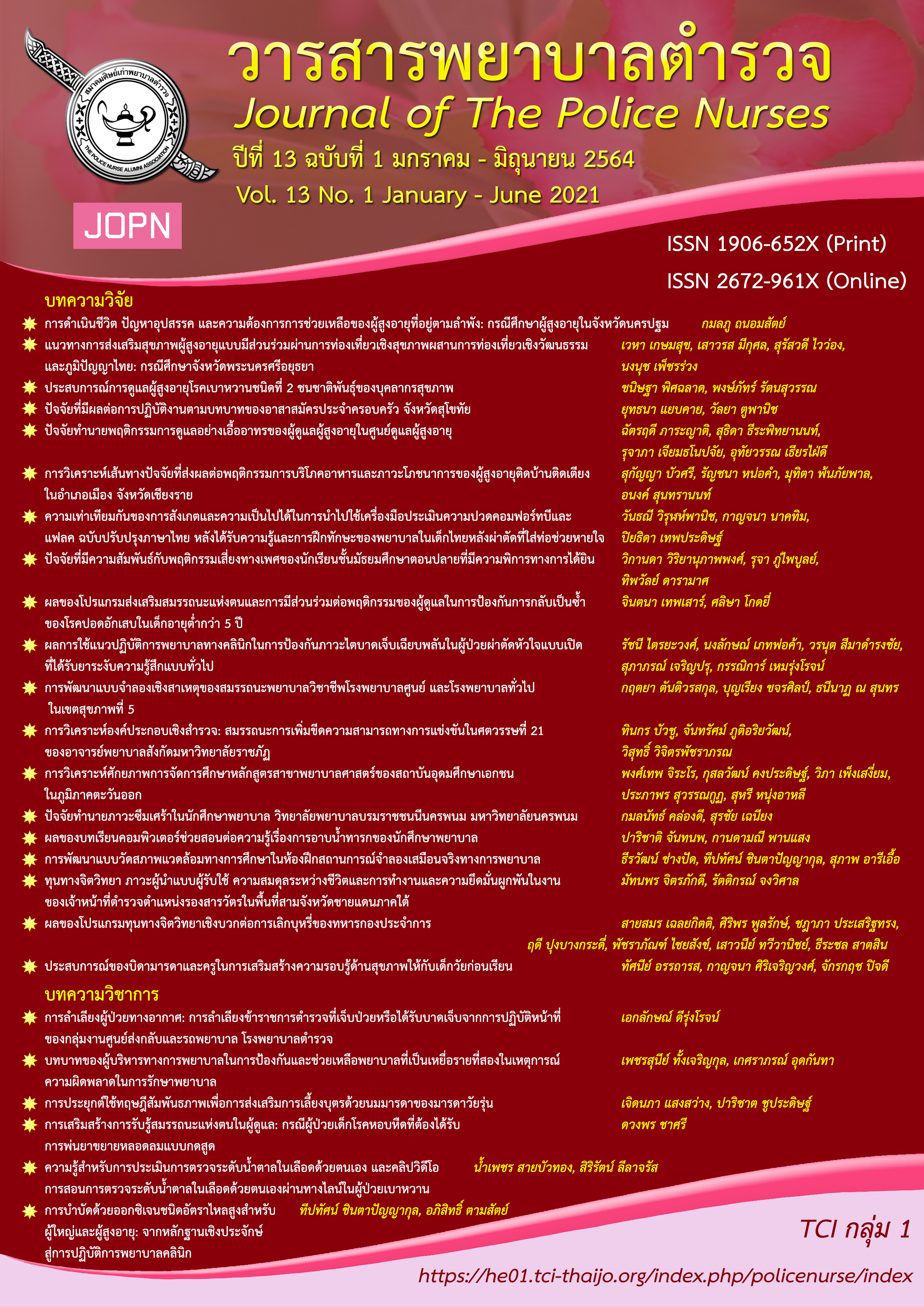EXPERIENCES OF PARENTS AND TEACHERS FOR ENHANCING HEALTH LITERACY OF PRESCHOOL CHILDREN
Keywords:
experience, parents, teacher, health literacy, preschool childrenAbstract
This qualitative study aimed to explore the experiences of parents and teachers in enhancing the health literacy of preschool children. Respondents are 15 fathers, mothers, or parents of preschool children at the age of 4-6 years, and 8 teachers at school. The researcher selected the respondents by purposive sampling. The research instrument was the semi-structured interview which was developed by the researcher based on the health literacy concept and verified by 2 nursing faculties. The data were collected by an in-depth interview. The data were analyzed by content analysis.
The results of the study revealed that the experiences of fathers and mothers in enhancing the health literacy of preschool children included the following: Mothers had access to children's health knowledge through the internet while perceiving that children had simple health knowledge, children acquired health knowledge from parents and teachers, and health knowledge of children was enhanced by doing daily routines together, talking, and gaining from the internet, as well as being a healthy role model for children. The reinforcing factor was seeing surrounding people and the obstacle was the limitation of the child's age. In addition, the experiences of teachers included the following: Teachers had access to health knowledge mostly via books, the internet, and training, teachers perceived that children gained health knowledge from their daily routines, and children still did not have access to health information, health knowledge was transferred to children by teaching, telling stories, and providing knowledge content on a routine basis, and children were motivated to gain knowledge by rewarding them. The reinforcing factors were surrounding people and the environment, and the obstacle was the child's age.
The results of this study helped to raise the understanding of parent’s and teacher’s experiences in enhancing the health literacy of preschool children, which the information from the study could be utilized as a guideline to further enhance the health literacy of preschool children and assisted the implementation of research and development of programs for promoting the health literacy of preschool children.
Downloads
References
Betz, C. L., Ruccione, K., Smith, K., & Chang, N. (2008). Health literacy: A pediatric nursing concern. Pediatric Nursing, 34(3), 231-239.
Broder, J., Okan, O., Bauer, U., Bruland, D., Schlupp, S., Bollweg, T. M., Pinheiro, P. (2017). Health literacy in childhood and youth: A systematic review of definitions and models. BMC Public Health, 17, 1-25. http://www.doi.org/10.1186/s12889-017-4267-y
Morrison, A. K., Glick, A., & Yin, H. S. (2019). Health Literacy: Implications for child health. Pediatrics in review, 40(6), 263-277.
Office of The Prime Minister. (2016). The twelfth national economic and social development plan (2017-2021). Bangkok: Office of The Prime Minister.
Okan, O., & World Health Organization. (2019). The importance of early childhood in addressing equity and health literacy development in the life-course. Public Health Panorama, 5(2-3), 170-176.
Potts, N. L. & Mandleco, B. L. (2012). Pediatric Nursing (3rd ed.). Australia: DELMAR.
Raingruber, B. (2017). Contemporary health promotion in nursing practice (2nd ed.). Burlington: Jones & Bartett Learning.
Sansom-Daley, V. M., Lin, M., Robertson, E. G., Wakefield, C. E., McGill, B. C., Girgis, A., & Cohn, R. J. (2016). Health literacy in adolescents and young adults: An updated review. Journal of Adolescent and Young Adult Oncology, 5(2), 106-118. http://www.doi.org/10.1089/jayau. 2015.0059
Talbot, L. & Verrinder, G. (2018). Promoting health: The primary health care approach. Australia: Elsevier.
Tachavijitjaru, C. (2018). Health literacy: A key indicator towards good health behavior and health outcome. Journal of Royal Thai Army Nurses, 19(supplement), 1-11.
Downloads
Published
How to Cite
Issue
Section
License
ผลงานที่ได้ตีพิมพ์แล้วจะเป็นลิขสิทธิ์ของวารสารพยาบาลตำรวจ















